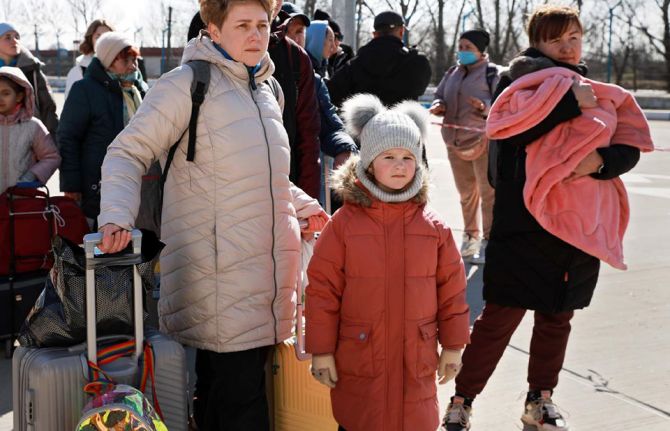

Feature Story
Report highlights that women and marginalized people need urgent access to health-care services in Ukraine
11 May 2022
11 May 2022 11 May 2022A new report by UN Women and CARE International highlights the urgent need to provide health-care services to women in Ukraine and sets out why the international community needs to support a gendered response to Ukraine’s humanitarian crisis.
The report also emphasizes the need for an intersectional approach to the crisis that addresses the exacerbated risks for marginalized communities—lesbian, gay, bisexual, transgender and intersex (LGBTI) people, Roma people, people living with disabilities and people living with chronic diseases—who face immense hardship and have particular needs with regard to their health and safety.
“This powerful report illustrates why and how humanitarian responses need always to be gendered and need also to address the particular needs of marginalized communities,” said Winnie Byanyima, the Executive Director of UNAIDS. “The courage and commitment of women leaders who continue to serve their communities, even in the face of war, in Ukraine and across the world is an inspiration.”
The report’s analysis, which was based on surveys and interviews with people in Ukraine, was conducted in April and details some of the gender dynamics of the crisis and sets out practical and actionable recommendations for the international humanitarian response.
Women and girls interviewed for the report highlighted challenges in access to health-care services, especially for survivors of gender-based violence and pregnant women and new mothers, as well as rising fears of gender-based violence and lack of food, especially for those in conflict areas.
Many respondents referred to the health risks, including the spread of COVID-19, linked to unsanitary shelters.
The war has also impacted access to sexual and reproductive health, including family planning and maternal, newborn and child health. Many media reports have noted that conditions as a result of the war have increased the risk of premature birth.
Transgender people also require regular access to medicines, but many have had to stop hormone therapy due to supply shortages. Several LGBTI organizations are providing access to medicines to members of the transgender community, but their help does not cover all the needs.
“The Rapid Gender Analysis allows us to consult directly with affected populations in order to accurately identify what specific needs different groups of people have, and how to best meet them,” said Sofia Sprechmann Sineiro, the Secretary General of CARE International. “What we are hearing from the people of Ukraine is that certain groups—such as those with disabilities, Roma and other ethnic minorities, single mothers and unaccompanied children—are each in need of different forms of protection and assistance. To keep our response effective and relevant, such groups must be consulted and prioritized across the aid ecosystem as this truly devastating situation continues to evolve.”
The report calls for support for women-led and women’s rights organizations that provide financial resources and for their voices to be amplified at national and international platforms.
Gaps in services to respond to gender-based violence need to be filled, according to the report, while sexual and reproductive health, including the clinical care of survivors of sexual assault, and maternal, newborn and child health care, including access to contraception, should be made a priority.
“It’s critical that the humanitarian response in Ukraine takes into account and addresses the different needs of women and girls, men and boys, including those that are furthest left behind,” said Sima Bahous, the Executive Director of UN Women. “This timely analysis provides the evidence of those needs, and their urgency. Women have been playing vital roles in their communities’ humanitarian response. They must also be meaningfully involved in the planning and decision-making processes to make sure that their specific needs are met, especially those related to health, safety and access to livelihoods.”



